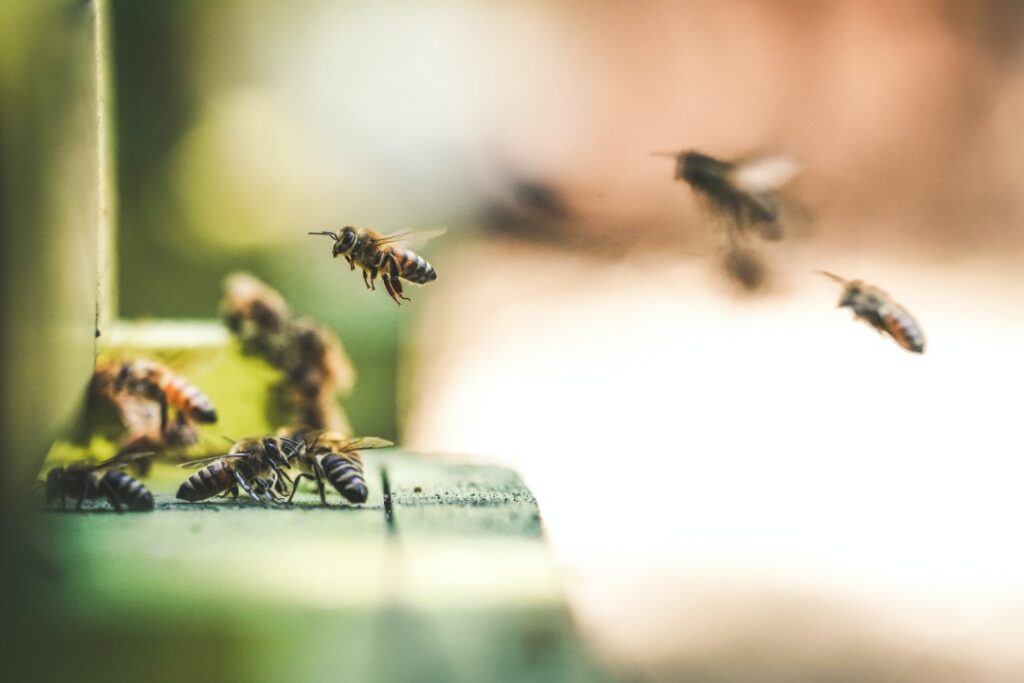Bees are amazing creatures. Not only do they create honey, but they’re also responsible for one out of every three bites of food we take. However, there’s so much more to bee products than just delicious treats.
In fact, bee products may even be able to help you with your allergy and skin issues. Here’s how.
Bee Pollen
While you might think of pollen as just a powdery substance that comes from flowers, the truth is that it’s much more than that. Bee pollen is high in protein, antioxidants, and vitamins. It takes the form of small granules when bees bring it back to the hive and create the final product. But how can you use it?
A Sweet Treat
We already discussed all of the great things that bee pollen contains. Essentially, it’s a superfood! But more than that, bee pollen can be a sweet and enjoyable treat. It makes an excellent addition to smoothies, oatmeal, yogurt, or even granola.
Allergen Aid
If you’re looking for a way to lessen the symptoms of seasonal allergies, bee pollen may be able to help. It is important to note that if you have a sensitivity to pollen, you should consult a doctor before starting any type of bee pollen regimen in your diet. But if you’re in the clear to add bee pollen to your diet, start out with one-half teaspoon a day and gradually work your way up. By the end of a four week period, you should be taking one to three tablespoons a day.
If you suffer from fall allergies, summer is the best time to start taking bee pollen.
Raw Honey
A drizzle of raw honey to your tea or morning oatmeal can be delicious. And fortunately, raw honey can help you in more ways than just making your breakfast the best meal of the day. In fact, raw honey can help with a whole host of skin issues, including:
- Blemishes
- Sunburn
- Dry Skin
- Oily Skin
- Rough Cuticles
- Chapped Lips
Honey has excellent antibacterial and antiviral ingredients. It’s also a humectant, which board-certified dermatologist Debbie Palmer defines for us as “[drawing] moisture to the air to keep skin moist.”
If you suffer from skin inflammation on your face or anywhere else, honey-infused skincare could be an excellent way to reduce it. Applying a dab of honey to an inflamed blemish can help tone down redness and swelling, while a honey face mask can help moisturize and even skin tone. A bit of raw honey on the lips can also help moisturize and soothe chapped skin. And it’s totally edible, so no worries there.
As with bee pollen, you should consult a dermatologist or esthetician before implementing any of these honey-based skin care solutions into your routine. But once you have the go-ahead, you’re in for a world of sweet skin salvation.
Bee Products and Budwig
In the food-based remedies that we will recommend and provide, we have sourced many products with royal jelly, bee pollen, and other products from bees. Many cancer patients stay away from honey, thinking that it is “sugar” and that it will feed their cancer. This is true of most honey sold in supermarkets because they are pasteurized. For honey to stay in liquid form, most store-bought honey is subjected to high temperatures, which sadly “kills” the enzymes. Raw honey preserves the enzymes and all the other essential properties.
Without bees, we wouldn’t have any of these products that can really help make a difference in skincare, allergies, and health in general. Now that you have a few tips on how to use them make sure you support local bees in your area when you decide to try raw honey or bee pollen.

Thank you for your very valuable newsletters!
I am greatly concerned about the disappearing presence of bees in our garden and even from farms about 2 hours drive from Pretoria where we live. I am allergic to bee venom and always aware of bees in my vicinity, but this spring started without them! I have not seen one!!!
Einstein warned that “If the bee disappeared off the face of the Earth, man would only have four years left to live. ” Is this happening already?
Blessings
Dear Dalene, although this article isn’t addressing that issue, it certainly is cause for concern and could cause us to wonder if we should continue to use bee products. The theories about why bees are disappearing don’t have anything to do with consuming too much of their products.